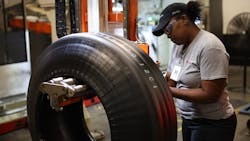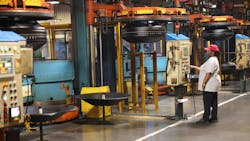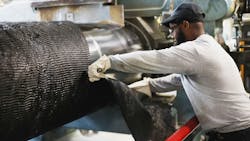WEST POINT, Mississippi—Since opening in 2015, Yokohama Rubber Company's first U.S. tire manufacturing plant has had to deal with the growing pains of being a new facility combined with the supply chain and economic woes of the pandemic, but hard work from the company has turned the factory around to give the trucking industry broader options than ever as it expands further into the U.S. market.
Approximately one-fifth of Yokohama's North American revenue is from commercial tire sales, such as those made at this Mississippi plant, according to President and CEO Jeff Barna.
"Prior to the Mississippi plant—obviously being reliant on offshore production made it difficult to capitalize on market opportunities. We never seemed to have the right product at the right place at the right time," Barna told FleetOwner at a press event. "Now, with the plant being here, the responsiveness, we can reduce inventory levels and increase speed to market, we're actually in a pursuit mode in terms of new business, whereby before the plant was here, it was a very allocation type of environment. We had to be very specific in who we could do business with without addressing incremental growth opportunities."
The tires made at the plant are used for both original equipment and replacement. Today, most of Yokohama's OE tires are made in Japan, but the Mississippi plant is finalizing its certification process and should be OE-certified by February, Barna told FleetOwner.
"We've gone from a very limited number of SKUs," Barna said, "14 to 15, to now we're comfortably producing 26 to 28 SKUs."
See also: Rohlwing: There's no substitute for natural tire rubber, so focus on conservation
From turnover to turnout
When Calhoun began working with Yokohama after 24 years with Ford, the plant saw 15% turnover, he told FleetOwner. That number has plummeted to 2.5% month-over-month turnover, which Calhoun described as competitive.
At that time, production stood at 625,000, with a "huge backorder," Calhoun said. Now, the facility has no backorders and shipped 808,000 tires last year. As it stands today, the plant could handle a 10-15% increase in production based on the physical capacity that its current machinery allows, meaning production could become close to 900,000 tires per year, according to Barna. He added that an expansion to the site could be on the horizon in two to three years if growth is sustained.
Yokohama's supply chain flexibility
Despite UAW strikes having started this past week at vehicle manufacturers such as Mack Trucks and Ford, Barna doesn't anticipate any changes in production. However, he added that the company has been in a "perpetual agility mode" since the pandemic.
See also: UAW strike extends to major truck plant
"Where a lot of companies struggle with adversity, we greet it at the front door with enthusiasm," Barna said. "That agility is a byproduct of the size of our company. We compete against giants," he added. "When you think about us being a $1.5-2 billion company here in North America, we have to have that ability to pivot quickly."
Additionally, Yokohama's research and development center in Charlotte, North Carolina, has been growing and can adapt and bring products to market faster than ever, Stan Chandgie, EVP of sales and sales operations, said.
"I love the level of flexibility we have," Chandgie told FleetOwner.
The supply chain has been moving more quickly for the company, according to Barna, who said that products shipped from Asia took over 120 days to reach the Port of Long Beach at one point. That is now down to 45 days.
"I think that the prognosticators had predicted a more level, balanced environment for our industry a little too early. I think it's like an earthquake," Barna said. "You have the major impact … then you deal with ongoing aftershocks. And I think the aftershocks were largely underestimated." He added: "If you're an agile company, you embrace that volatility, you can actually treat this as an opportunity to win in the market."
"I'd say we're in the best position we've been in in three or four years," Barna added.
Chandgie said that the company, via its network through dealers such as Mississippi-based Southern Tire Mart, is poised to grow further into the U.S. and possibly even grow the truck tire segment as a portion of overall revenue.
"I think the growth that we are seeing through acquisitions and greenfields and expansion in our dealer network—that gives us new markets, new capabilities. I would believe that our ability to grow on the commercial side as a ratio of our total business is definitely there," Chandgie told FleetOwner. He added: "It really will depend on the growth of our consumer segment," and that the company is focused on "responsible growth in both of those areas."
About the Author
Scott Keith
Scott Keith is a former fleet owner digital editor, who was on staff from 2022 to 2023.



